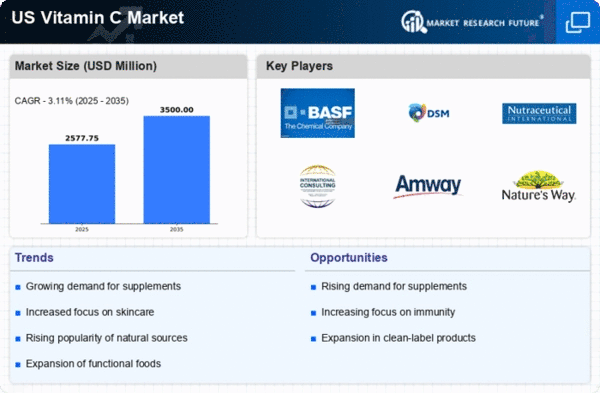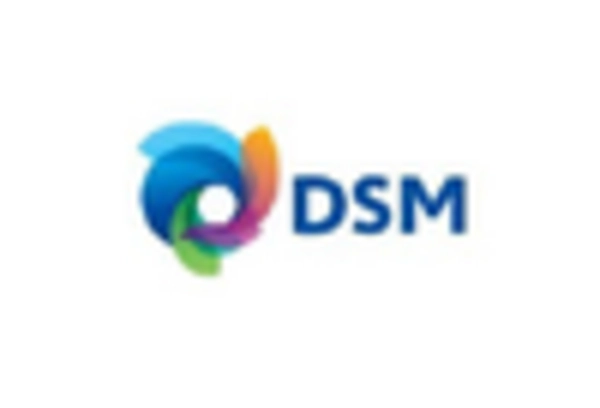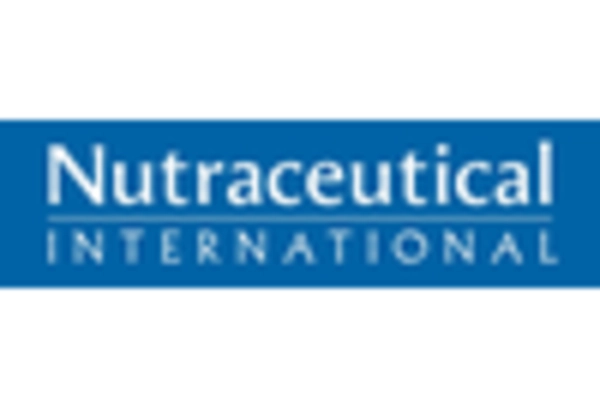Expansion of E-commerce Platforms
The rapid expansion of e-commerce platforms is significantly impacting the vitamin c market. Online shopping has become increasingly popular, providing consumers with convenient access to a wide range of vitamin C products. In 2025, e-commerce sales in the vitamin c market are expected to account for over 30% of total sales, driven by the ease of purchasing and the availability of detailed product information. This shift towards online retail is likely to attract a broader consumer base, including younger demographics who prefer digital shopping experiences. Consequently, the vitamin c market is poised for growth as e-commerce continues to reshape consumer purchasing behaviors.
Innovations in Product Formulations
Innovations in product formulations are playing a crucial role in shaping the vitamin c market. Manufacturers are increasingly developing new and improved formulations that enhance the bioavailability and effectiveness of vitamin C. This includes the introduction of liposomal vitamin C and other advanced delivery systems that improve absorption. As consumers become more discerning about product quality, these innovations are likely to attract attention and drive sales. In 2025, the vitamin c market is expected to see a surge in demand for these innovative products, as they align with consumer preferences for efficacy and quality in health supplements.
Growing Awareness of Health Benefits
Increasing awareness of health benefits associated with vitamin C is a primary driver in the market.. Consumers are becoming more informed about the role of vitamin C in boosting immunity, enhancing skin health, and preventing chronic diseases. This heightened awareness is reflected in the rising sales of vitamin C supplements and fortified foods. In 2025, the vitamin c market is projected to reach approximately $3 billion in the US, indicating a robust growth trajectory. As consumers prioritize health and wellness, the demand for vitamin C products is likely to continue its upward trend, further solidifying its position in the vitamin c market.
Increased Focus on Clean Label Products
The rising consumer preference for clean label products is significantly influencing the vitamin c market. Shoppers are increasingly seeking transparency in ingredient sourcing and production processes, favoring products that are free from artificial additives and preservatives. This trend is prompting manufacturers to reformulate their vitamin C offerings to meet consumer demands for natural and organic options. In 2025, it is estimated that clean label products will constitute over 40% of the vitamin c market, reflecting a shift towards healthier, more transparent choices. This focus on clean labels is likely to drive innovation and competition within the vitamin c market.
Rising Interest in Preventive Healthcare
The growing interest in preventive healthcare is a significant driver for the vitamin c market. As individuals increasingly seek to maintain their health and prevent illness, the demand for vitamin C supplements is on the rise. This trend is supported by a shift in consumer behavior towards proactive health management, with many individuals incorporating vitamin C into their daily routines. In 2025, the vitamin c market is anticipated to grow by approximately 5% annually, reflecting this shift. The emphasis on preventive healthcare is likely to sustain the demand for vitamin C products, reinforcing their importance in the vitamin c market.
















